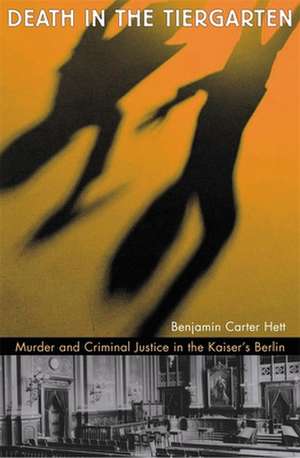Death in the Tiergarten – Murder and Criminal Justice in the Kaiser′s Berlin
Autor Benjamin Carter Hetten Limba Engleză Hardback – 17 iun 2004
Drawing on previously untapped sources, including court records, pamphlet literature, and pulp novels, Hett examines how the law reflected the broader urban culture and politics of a rapidly changing city. In this book, German criminal law looks very different from conventional narratives of a rigid, static system with authoritarian continuities traceable from Bismarck to Hitler. From the murder trial of Anna and Hermann Heinze in 1891 to the surprising treatment of the notorious Captain of Koepenick in 1906, Hett illuminates a transformation in the criminal justice system that unleashed a culture war fought over issues of permissiveness versus discipline, the boundaries of public discussion of crime and sexuality, and the role of gender in the courts. Trained in both the law and history, Hett offers a uniquely valuable perspective on the dynamic intersections of law and society, and presents an impressive new view of early twentieth-century German history.
Preț: 339.42 lei
Nou
Puncte Express: 509
Preț estimativ în valută:
64.95€ • 69.45$ • 54.15£
64.95€ • 69.45$ • 54.15£
Carte tipărită la comandă
Livrare economică 17 aprilie-01 mai
Preluare comenzi: 021 569.72.76
Specificații
ISBN-13: 9780674013179
ISBN-10: 0674013174
Pagini: 304
Dimensiuni: 176 x 235 x 25 mm
Greutate: 0.57 kg
Editura: Harvard University Press
ISBN-10: 0674013174
Pagini: 304
Dimensiuni: 176 x 235 x 25 mm
Greutate: 0.57 kg
Editura: Harvard University Press
Descriere
A detailed account of the judicial system in Berlin at the turn of the 20th century. Far from being rigid and authoritarian, Hett shows how the courts reflected the urban culture and politics of a rapidly evolving city.
